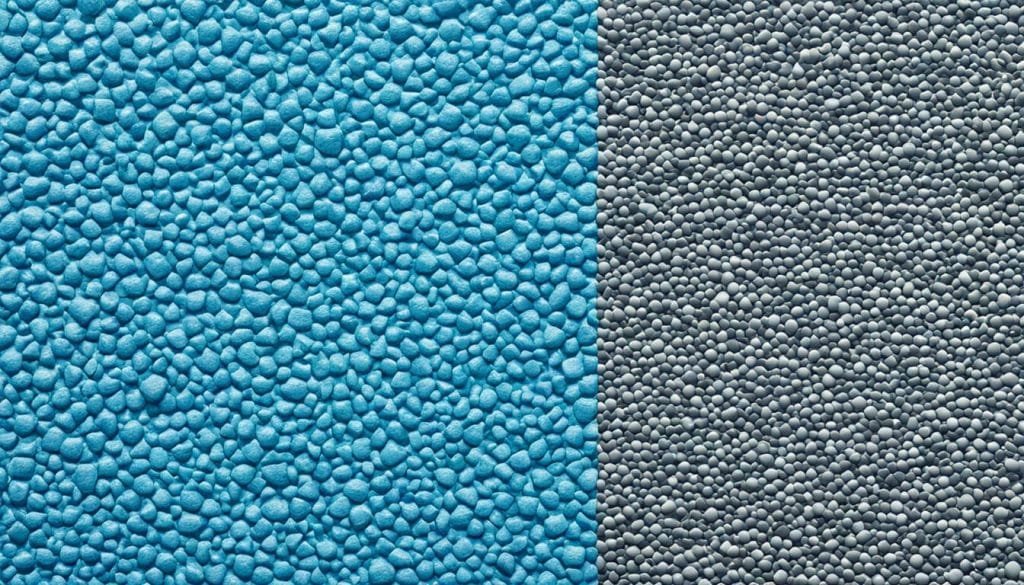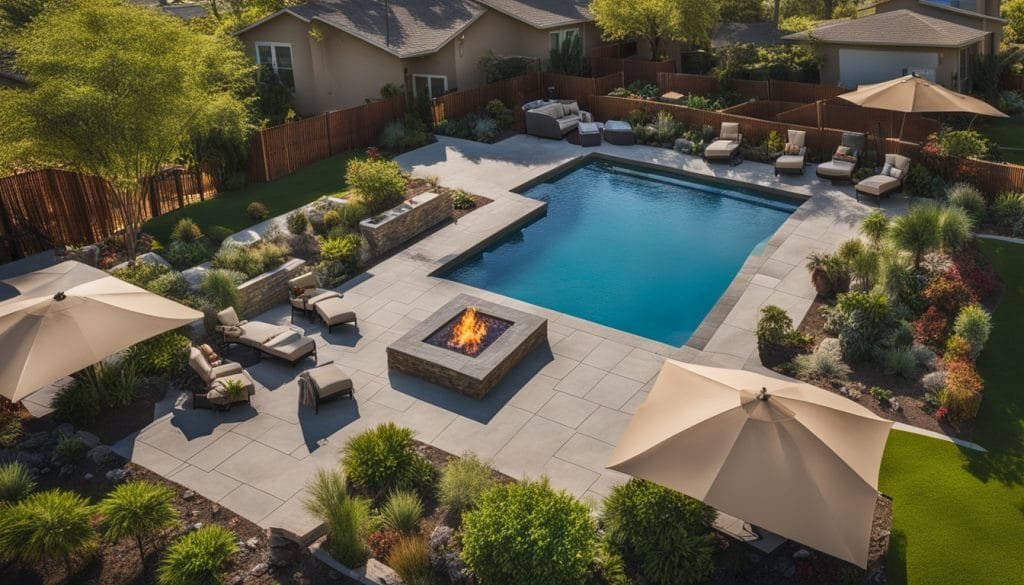Choosing the right pool cover is a key decision for our swimming pools. There are many Types of Pool Covers to pick from, each offering unique benefits. The right cover keeps the pool clean, safe, and energy-efficient. It also saves us money on upkeep and energy over time.
Homeowners have several options like mesh, solid safety, and solar covers. Each type protects the pool from debris and weather. Knowing these choices helps us pick the best one for our lifestyle and budget. Plus, the right cover can cut down on chemicals and energy use, saving us up to 50% on bills. For more info on pool covers, check out detailed guides.
Exploring the different pool covers and their benefits helps us keep our pools safe and fun. It’s key to look at each cover’s features and how long it lasts. This way, our pools stay in top shape against the elements.
Key Takeaways
- Choosing the right pool cover helps maintain water quality and reduces maintenance efforts.
- Solar pool covers can raise water temperatures by up to 15 degrees, enhancing swimming comfort.
- Solid safety pool covers offer excellent durability and can withstand significant weight.
- Mesh safety covers provide a lightweight option while allowing rainwater to pass through.
- Investing in a quality pool cover can lead to significant savings on chemicals and energy costs.
- Regular maintenance is essential for solid pool covers, especially during winter.
- Explore more about the benefits and features of different pool cover types at this informative blog.
Introduction to Pool Covers
Owning a pool brings joy, relaxation, and fun. To keep our pools in top shape, we need to pick the right pool cover types. These covers are key in keeping the water clean and safe. They also cut down on the work needed to keep the pool ready for use.
Importance of Pool Covers
Pool covers act as a barrier, stopping debris from getting into the water. This keeps our pools safe from the elements. It helps in getting cleaner water. With the right cover, we can spend more time enjoying our outdoor space.
Benefits of Using a Pool Cover
Getting a pool cover has many perks, including:
- Water conservation by reducing evaporation.
- Enhanced safety, especially for families with children and pets.
- Lower chemical usage, keeping cleaner water over time.
- Less heating cost by retaining warmth.
Looking into these benefits shows us why a pool cover is a smart choice for our backyard.
Investment Considerations
When looking at investment considerations, we must weigh the upfront costs against long-term savings. Knowing how long different covers last helps us make better choices. For example, solid vinyl covers can last 7 to 10 years, while automatic covers last about 5 years. Choosing a commercial-grade ProMesh cover can last over 15 years. This knowledge helps us avoid future costs and make smart choices.
In conclusion, when thinking about our investment, we should focus on protecting our pools. This way, they stay a place of relaxation and fun.
Types of Pool Covers
There are many types of pool covers to choose from, each suited for different needs. Knowing about them helps us pick the right Swimming Pool Cover Materials for our pools. Let’s look at some popular ones.
Solar Pool Covers
Solar pool covers, also known as bubble covers, trap sunlight and heat in our pools. They keep the heat in, raising the temperature by up to eight degrees. This makes them a cost-effective way to save energy and reduce water loss.
These covers don’t keep out small children or pets but work well with pool cover rollers for easy use.
Winter Pool Covers
Winter pool covers keep our pools safe during the cold months. They let water drain but block debris. These covers can handle tough weather, keeping our pools clean and safe when not in use.
They’re key to making our pools last longer by protecting them from the elements.
Mesh Pool Covers
Mesh pool covers are great for safety and ease. They fit any pool perfectly and can even hold the weight of an elephant. These covers keep debris out and prevent accidental pool entries, ideal for families with kids or pets.
They need regular cleaning but are a strong and effective choice for safety.
Automatic Pool Covers
Automatic pool covers are easy to use and very effective. They’re the priciest option but worth it. These covers stop heat from escaping and cut down on water loss, saving money on heating and water.
With just a button press, we can keep our pools clean and warm without effort.
Solid Vinyl Safety Pool Covers
Solid vinyl safety covers focus on security and peace of mind. They can handle a lot of weight, making them great for families with young kids. These covers need cleaning now and then but are a solid choice for keeping pools safe.
They’re a dependable option in Inground Pool Cover Solutions, focusing on safety and effectiveness.
Comparing Different Pool Cover Materials
Choosing the right material for your pool cover is key. You need to think about how long it lasts, how much upkeep it needs, how much it costs, and its effect on the environment. Each type of cover has its own strengths, making it important to pick wisely.
Durability and Longevity
Pool covers vary in how long they last. Polycarbonate pool covers are known for lasting over 25 years. Mesh covers, however, only last 2 to 3 seasons because they are so light. Mesh lets water through, which can save on upkeep but might not keep your pool as clean. Solid covers can cut evaporation by up to 95%.
Maintenance Requirements
How much upkeep a cover needs differs. Mesh covers need regular cleaning to stop debris from building up. Solid and polycarbonate covers are easier to maintain, needing less cleaning over time. Liquid evaporation suppressants need to be applied often to work well. Knowing what maintenance is needed helps us plan better.
Cost-Effectiveness
Looking at the cost of pool covers means considering both the initial price and long-term savings. Polycarbonate covers cost about $2,999 but can save more than $10,000 over time because they work so well. Mesh covers are cheaper at first but might cost more to maintain over their shorter life. Solar covers can cut heating costs by up to 70% for heated pools.
Environmental Impact
With water scarcity in places like South Africa, the environmental impact of pool covers is huge. Solid and mesh covers greatly reduce water loss—solid covers up to 95%, mesh around 90%. Saving water is crucial for our planet and should guide our choice of covers.

| Cover Type | Average Lifespan | Evaporation Reduction | Cost | Environmental Impact |
|---|---|---|---|---|
| Polycarbonate | 25+ years | 95% | $2,999 | High |
| Mesh | 2-3 seasons | 90% | Varies | Medium |
| Solid | 5-10 years | 95% | Varies | High |
| Solar | 5-7 years | 50-95% | Varies | High |
Understanding the details of different pool cover materials helps us make smart choices. It’s about finding the right balance between cost, effectiveness, and environmental impact. Looking at options like those on pools with various materials can help us decide.
Selecting the Right Pool Cover for Your Needs
Choosing the perfect pool cover is about looking at what we need. We must think about our pool type and the weather in our area. The right cover makes our pool safer, more efficient, and easier to keep clean.
Assessing Your Pool Type
Every pool is different. For example, in-ground, above-ground, and custom-shaped pools need special Outdoor Pool Cover Choices. We should look at our pool’s size and shape. This ensures the cover fits well and keeps our pool safe.
Climate and Seasonal Considerations
The weather affects what pool cover we choose. In cold places, we need strong covers to stop snow and ice. In hot areas, covers that cut down on evaporation and keep in heat are best. For example, the CoolGuard™ Ultra cover is great for hot summers.
Safety Features to Consider
Keeping everyone safe is key. Covers with safety features are a must, especially for families. Mesh covers stop people from falling in and can hold a lot of weight. These features make our pool safer for everyone.
Budgeting for a Pool Cover
Knowing what we can spend is important when picking a cover. Budgeting for a Pool Cover means looking at upfront costs and long-term savings. High-quality covers like the EnergyGuard™ Selective Transmission can save on heating, chemicals, and upkeep. This means we save money over time. Looking at different options helps us find something that fits our budget.

Choosing the right pool cover means understanding our pool, the weather, safety needs, and budget. For more info on pool coverings, check out the available products.
Conclusion
As we conclude our look at pool covers, it’s clear they’re crucial for a great swim. Solar covers warm the water by up to 15 degrees Fahrenheit. Winter covers need replacing every five years. Each type has its own role in our pools.
Mesh covers last 10 to 15 years and let sunlight and rainwater keep the water clean. They might need more cleaning, though. Solid vinyl covers stop debris and algae, but they’re heavier and take up more space. Each cover has its benefits, helping us choose the right one for our needs.
The best pool cover meets our needs and keeps the pool safe and clean. By looking at each cover’s features and our own needs, we can pick the perfect one. Making the right choice means our pools stay protected and we enjoy them more for years.

